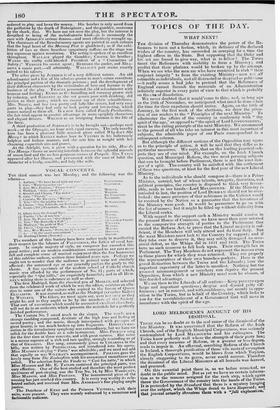TOPICS OF THE DAY.
WHAT NEXT?
THE division of Thursday demonstrates the power of the Re- formers to turn out a faction, which, in defiance of the declared
wishes of the country, has succeeded in usurping for a time the highest offices in the State. But supposing that the Duke and his set are forced to give way, what is to follow ? The Tories taunt the Reformers with inability to form a Ministry ; sad predict that their phalanx would be broken up by the attempt. When we see who the men are who have contrived to club" their conjunct iniquity' to form the existing Ministry—men noL all estimable as individuals, and all distrusted or despised as politieians —it really seems a bad joke to pretend that the Reformers of England cannot furnish the materials of an Administration infinitely superior in every point of view to that which is probably
on the ono of dissolution.
We never doubted that it woulecome to this; and, so long ago as the 29th of November, we anticipated what must be done e hen the tune for their expulsion should arrive. Again, on the 10th of January, in the first week of the elections, we drew the atten- tion of our readers to the "Principles of the next Ministry." To
administer the affairs of the country in conformity with " the spirit of the age,- as opposed to "tile spirit of Lord LONDONDERRY," must be the ruling principle of the next Ministry. We recommend
to the perusal of all who take an interest in this most important of subjects, the admirable paper of our Paris correspondent in a subsequent column. But although the different sections of the Opposition may agree as to the principle of action, it will be said that they dilliot as to particular measures. We reply, that on the leading practical sub- jects they are of one mind. For example, on the Irish Church question, and Municipal Reform, the two most pressing subjects that can be brought before Parliament, there is not the least dan- ger of a split. The country will be satisfied with the settlement of these two questions, at least for the first year of the new Liberal Ministry.
As to the individuals who should compose it—there is a Prime Minister, untried, hut of whose talents, integrity, discretion, and political principles, the country is disposed to think very thvour- ably, ready to our hands—Lord MELBOURNE. If the Ministry is intended to last, the position of Lord DURHAM should not be over- looked: the mere presence of that nobleman in the Cabinet would be received by the Nation as a guarantee that the intentions of the Ministry were good. It would be premature to go on with the list of names; but it might be filled up without difficulty froru the Liberal ranks.
With regard to the support such a Ministry would receive in the present House of Commons, we have more than once referred to the comparative strength of parties in the Parliament that carried the Reform Act, to prove that the Liberal majority is suf- ficient, if the Members will only attend and do their duty. But the next Ministers must look to the Country for support; and if they take care to deserve it, they may safely disregard an occa- sional defeat, as the Whigs did in 1831 and 1832. The Tories have no such resource to fall back upon. Their strength lies in Parliament. The Tory Members do not represent the masses even in those places for which they were returned. They are properly the representatives of their own breeches-pockets. here is the grand distinction between the Tories and the Liberals ; here the important superiority of the latter is manifest. Nothing but the grossest mismanagement or treachery can deprive the present Opposition, from Which a new Ministry must soon be chosen, of this decided advantage. We say then to the Liberals of all sections—Keep your eye upon large and important questions ; despise and discard petty off- ferences ; act in concert, and with confidence, not merely hi oppo- sition to the Tories, but in behalf of the Country, which looks to you for the reestablishment of a Government that will move in accordance with the spirit of the age.
























 Previous page
Previous page